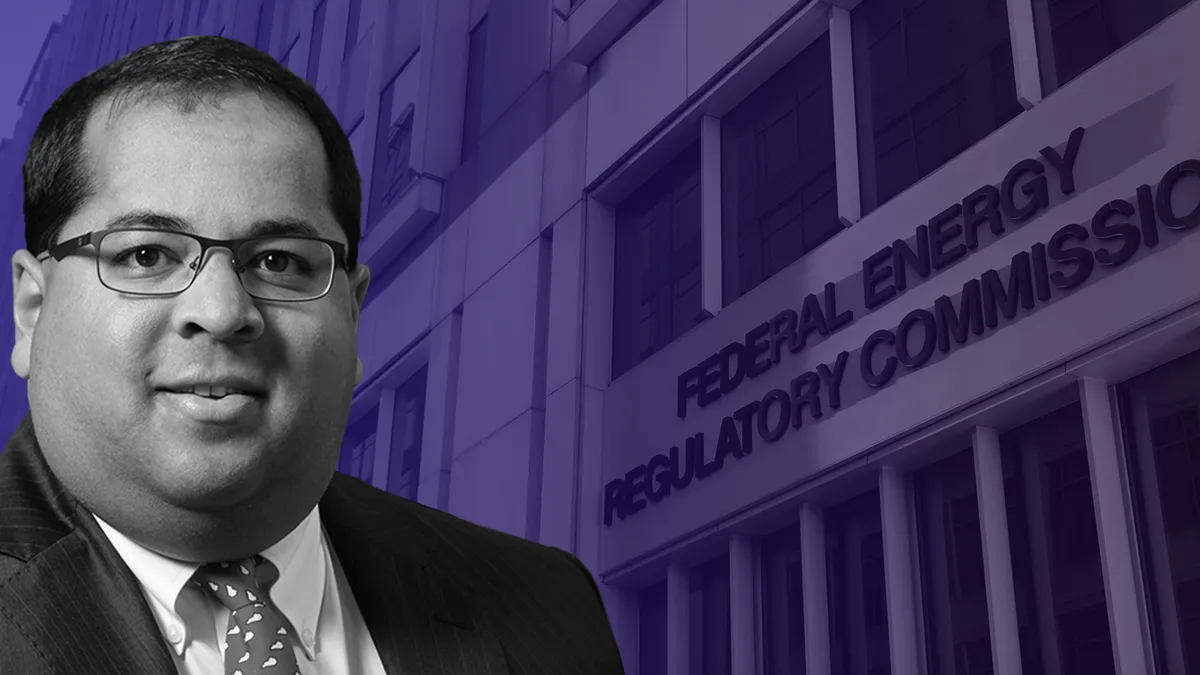Dive Brief:
-
Former chair of the Federal Energy Regulatory Commission Neil Chatterjee on Wednesday acknowledged that excluding state voices from FERC's carbon pricing conference may have been a "mistake."
-
"These are difficult jobs and it's tough to get everything right. And I humbly acknowledge that I make mistakes. I make mistakes all the time," he said during a Q&A at a virtual National Association of Regulatory Utility Commissioners (NARUC) conference, where a question was asked about state regulators' absence from the technical conference on carbon pricing. "We could have done better. And with further reflection and more time, I acknowledge there could have been greater inclusion of direct state voices," he added.
-
The commission was criticized for not including state regulators within wholesale markets on any of the panels at the conference, as well as for lacking gender and racial diversity. Chatterjee had previously defended his choices, saying he felt their voices were still represented, a position he repeated Thursday.
Dive Insight:
Chatterjee on Thursday attempted to defend decisions he's made over the past few years as chairman that have been criticized by state regulators, promising he would work closely with the states going forward as a commissioner.
Chatterjee was demoted from his role as chairman last week by the White House, a move he and others think could have been in response to his action on carbon pricing. He will stay on as commissioner until his role is up in June of next year.
Tensions between state and federal regulators reached an "all time high" this year, according to stakeholders frustrated with what they saw as FERC interfering in state clean energy plans. And although states had been in discussions with the commission to join its carbon pricing conference, no regulator from a FERC-regulated state was chosen.
"It's certainly something not unexpected as far as FERC goes," said New Jersey Board of Public Utilities President Joseph Fiordaliso at the time. "I don't think they're our friend right now," he added, referring to one of his state's grievances with the commission — FERC's decision to expand the Minimum Offer Price Rule within the PJM Interconnection.
FERC was also criticized for its lack of gender and racial diversity on the carbon pricing panels, and North Carolina Utilities Commissioner ToNola Brown-Bland asked Chatterjee to answer for those criticisms during the NARUC conference.
"We have great opportunity to cast a wider net and to bring more people to the table," Chatterjee said, adding that he believes part of his legacy at the commission will be that he brought more voices into the fold.
New York regulators have also taken issue with the commission over its rejection of the New York Independent System Operator's buyer-side mitigation rules, and Chatterjee attempted to defend himself against critics of the NYISO and PJM decisions, among others. He pledged that in his new role as commissioner, he will work hard to better engage states in policy conversations.
"The nature of difficult decision making is you can't keep everybody happy. I know that some of the orders which I have supported, like our PJM MOPR and New York ISO buyer side [mitigation] rules have caused me to be criticized by many," he said.
FERC came into conflict with NARUC over another less contentious order — Order 841, passed in 2018, was intended to lower the barriers for energy storage in wholesale markets. But NARUC challenged the rule, calling it an overstep of FERC authority, and ultimately brought it to the U.S. Court of Appeals for the D.C. Circuit. The court ruled in FERC's favor this summer, opening the doors for FERC to pass a similar order lowering barriers for distributed energy resources.
"While we have great support, there were some concerns raised within the community on orders, like 2222," said Chatterjee, acknowledging some NARUC members likely have many of the same issues with that rule as they did Order 841.
"Look, I wish it were possible for everyone to support all the actions that we've taken during my time as chairman. And as I reflect upon it, I think being criticized from both sides demonstrates that I was a successful leader of an independent agency," he said.
"One of the reasons I want to stay on the commission and continue to work hard and be constructive" is so that he can "build on the work that we've done, and learn from the mistakes that I made and move forward," he said. "States are going to be a critical part of the discussion going forward. And I look forward to building upon the good work that we've done."















